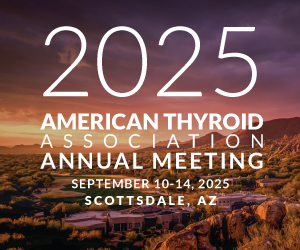September 26, 2007—The American Thyroid Association (ATA) is pleased to announce the recipients of two ATA/Thyca 2007 thyroid cancer research grants. The grants were created to support new investigators for a research project in thyroid cancer and one in medullary thyroid cancer. Research grants, up to $25,000 annually, were awarded for two-year terms, with renewals based on satisfactory progress report from funded investigators in the fourth quarter of the first year.
In addition to newly-awarded grants, two 2006 ATA/Thyca thyroid cancer research grants were renewed, due to the current status of their research projects.
The grants were funded by ThyCa: Thyroid Cancer Survivors’ Association, Inc., with the administrative costs of the grant review process supported by the ATA.
“ThyCa: Thyroid Cancer Survivors’ Association is thrilled to raise much-needed funds for thyroid cancer research, and is grateful for the opportunity to work with the ATA. We’re especially pleased that we have the opportunity to provide these funds to the best thyroid cancer research projects proposed by young investigators, with applications open to researchers and research centers worldwide,” says ThyCa Executive Director Gary Bloom.
“These grants are an important ongoing step as ThyCa constituents around the blog continue to raise funds urgently needed for research to improve the treatment and find cures for all thyroid cancer,” said Bloom. “We are grateful to everyone in the ATA for their commitment, concern, and support for people coping with thyroid cancer.”
2007 ATA/ThyCa Grant Recipient – Thyroid Cancer
 Krystian Jazdzewski, M.D., Ph.D
Krystian Jazdzewski, M.D., Ph.D
Assistant Professor, Medical University of Gdansk, Poland
Visiting Scientist, Ohio State University
Project: The Role of miR146a in Papillary Thyroid Carcinoma
Krystian Jazdzewski, M.D., Ph.D., and his research team are searching for genetic factors which predispose those to papillary thyroid carcinoma (PTC). It is worthwhile because an inherited predisposition to differentiated thyroid cancer is very strong, one of the highest of all cancers (3- to 8-fold higher risk for first-degree relatives than in general population). Although changes in key cell-signaling systems and gene translocations are sometimes present in thyroid tumors, no specific gene mutations have yet been identified that are directly linked to the predisposition of this type of cancer. We reason that the previous failure to identify genes predisposing or contributing to PTC might be because these genes show low penetrance. The mechanisms may require the interaction of two or more genes; thus, regulatory, rather than protein-encoding, genes might be involved. MicroRNAs fulfill these criteria.
“We believe that our findings will facilitate new approaches to the diagnosis and treatment of PTC,” said Dr. Jazdzewski. Bio
2007 ATA/ThyCa Grant Recipient – Medullary Thyroid Cancer
 Mabel Ryder, M.D.
Mabel Ryder, M.D.
Assistant Attending Physician, Division of Endocrinology, Memorial Sloan-Kettering Cancer Center, New York
Project: The Role of Tumor-Associated Macrophages on Thyroid Cancer Progression
It has become increasingly recognized that the tumor microenvironment plays a key role in promoting tumor cell differentiation, growth and spread. Tumor environments are richly infiltrated with immune cells and investigations have shown a strong link between these cells and tumor progression. Thyroid cancers are richly infiltrated with immune cells, in particular tumor-associated macrophages (TAMs). Yet, their role on thyroid cancer progression has not been clearly investigated.
Mabel Ryder, M.D., and her research team have shown that the density of TAMs correlates with tumor grade and tumor progression in well-differentiated, poorly-differentiated and anaplastic human thyroid cancers, suggesting that TAMs may be involved in thyroid cancer progression. We have developed a model to investigate the role of TAMs on thyroid cancer progression using a transgenic mouse model of oncogenic BRAF-dependent papillary thyroid cancer in which TAMs can be selectively depleted. In this manner, we will examine the functional role of TAMs on thyroid cancer progression, on tumor angiogenesis and on tumor metastases.
“Evidence strongly suggests that tumor-associated macrophages facilitate and may even be required for tumor progression,” said Dr. Ryder. “The support of my research through this award will allow me to investigate the role of these and other immune cells on thyroid cancer progression.” Bio
2006 ATA/ThyCa Grant Renewals
The 2006 grant recipients were awarded second-year grant renewals:
Lionel Groussin, M.D., Ph.D.
Associate Professor, Cochin Hospital, Paris, France
ATA/ThyCa Grant – Thyroid Cancer
Project: Regulation and expression of dual specificity phosphatases in papillary thyroid carcinoma
In papillary thyroid carcinoma (PTC), activating-mutations of genes encoding effectors of the mitogen-activated protein kinase (MAPK) pathway are central for malignant transformation. This pathway transduces mitogenic signals via activation of receptor tyrosine kinases, leading to the successive recruitment and activation of RAS and members of the RAF family of serine/threonine kinases. A cascade of phosphorylation culminate in the activation of the extracellular signal-regulated kinases (ERK). Levels of ERK phosphorylation are dictated by the coordinated activities of protein kinases and protein phosphatases. The MAPK phosphatase family consists of dual specificity phosphatases (DUSP). DUSP6 and DUSP5 are selective ERK phosphatases, acting respectively in the cytoplasm and the nucleus.
Lionel Groussin, M.D., Ph.D. and his research team are studying the regulation of two DUSPs in thyroid cells expressing inducible oncogenes (RET/PTC, H-RasG12V and BRAFV600E). We will knockdown these phosphatases to study the consequences on ERK phosphorylation and on biological activity. We anticipate a different pattern of induction and/or expression of the phosphatases, depending on the level of the thyroid oncogene in the MAPK pathway.
“We predict that the knockdown of the phosphatases will prevent ERK dephosphorylation and induce a superactivation of the MAPK pathway,” said Dr. Groussin. “This project explores the hypothesis that DUSP6 and/or DUSP5 are candidate tumor suppressors genes.”
Xianmin Xia, Ph.D.
Research Associate, Division of Endocrinology, Johns Hopkins Bayview Medical Center, Baltimore, Maryland
ATA/ThyCa Grant – Medullary Thyroid Cancer
Project: Targeting p55PIK phosphoinositide-3 kinase (PI 3-kinase) in the treatment of human thyroid cancers
Some thyroid cancers dedifferentiate and become highly malignant. Chemotherapy for these thyroid cancers has provided only limited benefits and new therapies utilizing novel targets would be beneficial to patients. Among potential targets are the PI 3-kinase signaling pathways, which have been shown to be involved in aggressive thyroid cancer growth and progression. Previously, Xianmin Xia, Ph.D. and her team showed that p55PIK, a regulatory subunit of PI 3-kinase, specifically interacts with retinoblastoma protein (Rb) through p55PIK’s unique amino-terminus. To study this interaction site as a potential drug target for aggressive thyroid cancer therapy, we generated an adenovirus construct expressing a peptide containing the 24 N-terminal amino acid residues of p55PIK (N24).
In this study supported by this grant, Dr. Xia’s and her team examined the effects of N24 on the cellular proliferation of five human thyroid cancer cell lines: FTC 133, ARO, WRO, NPA and FTC 236 cells. In all cell lines tested, N24 significantly inhibited the cell proliferation. Surprisingly, N24 strongly inhibited cell proliferation in FTC 236 follicular thyroid cancer cells, which do not express Rb proteins, by blocking cell cycle transition at both S and G2/M phases. These data suggest that the p55PIK regulatory subunit regulates cell cycle progression at different checkpoints by Rb-dependent and Rb–independent mechanisms.
“Our studies also show very promising effects of adenovirus expressing N24 on thyroid cancer growth in xenograft tumor models,” said Dr. Xia. “Taken together, these findings demonstrate that N24 peptide or peptide-mimetic drugs that target the p55PIK regulatory subunit may be a novel and potent therapy for thyroid and other cancers.”
For more information, please contact the ATA at thyroid@thyroid.org.



